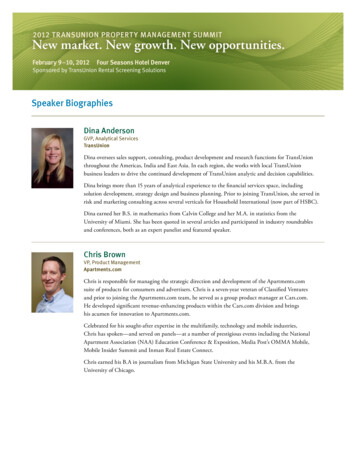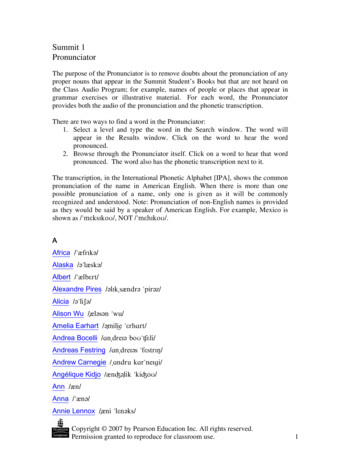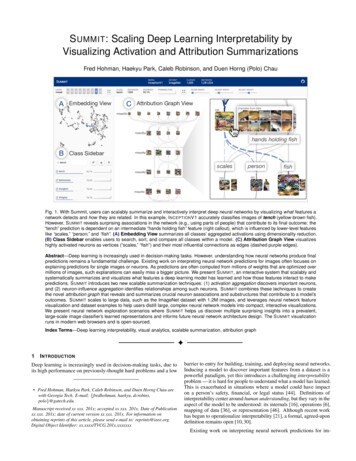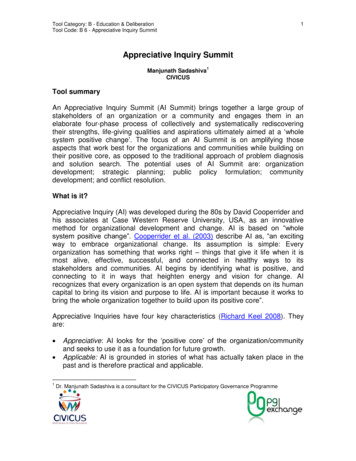
Transcription
GROUNDWORKS1
Copyright 2020 The Summit Church.Unless otherwise indicated, all Scripture quotations are from the ESV Bible (The Holy Bible, English Standard Version ). Copyright 2001 by Crossway, a publishing ministry of Good News Publishers. Used by permission. All rightsreserved.Scripture quotations marked CSB have been taken from the Christian Standard Bible . Copyright 2017 by HolmanBible Publishers. Used by permission. Christian Standard Bible and CSB are federally registered trademarks of Holman Bible Publishers.Scripture quotations marked NASB have been taken from the New American Standard Bible (NASB). Copyright 1960,1962, 1963, 1968, 1971, 1972, 1973, 1975, 1977, 1995 by The Lockman Foundation. Used by permission. www.lockman.org.Scripture quotations marked NIV have been taken from The Holy Bible, New International Version , NIV . Copyright 1973, 1978, 1984, 2011 by Biblica, Inc. Used by permission of Zondervan. All rights reserved worldwide. www.zondervan.com. The “NIV” and “New International Version” are trademarks registered in the United States Patent and Trademark Office by Biblica, Inc. Scripture quotations marked RSV have been taken from the Revised Standard Version of the Bible. Copyright 1946,1952, and 1971 by the National Council of the Churches of Christ in the United States of America. Used by permission.All rights reserved worldwide.Scripture quotations marked YLT have been taken from the 1898 Young’s Literal Translation of the Holy Bible by J.N.Young, (author of the Young’s Analytical Concordance), public domain.All emphases in Scripture quotations have been added by the author.Some content taken from Spiritual Disciplines for the Christian Life by Donald S. Whitney.Copyright 1991, 2014. Used by permission of NavPress. All rights reserved. Represented byTyndale House Publishers, a Division of Tyndale House Ministries.2GROUNDWORKS
GROUNDWORKS3
TABLE OF CONTENTSWelcome 9Preface 12How to Use Groundworks 14Week 1: The Gospel 19Week 2: Worshiper 51Week 3: Family Member 87Week 4: Servant 119Week 5: Steward 151Week 6: Witness 189Appendix 241GROUNDWORKS5
THE SUMMIT CHURCHMISSION————6GROUNDWORKS
Following theHoly Spirit, weexist to create amovement ofdisciple-makingdisciples, in RDUand around theworld.GROUNDWORKS7
8GROUNDWORKS
GROUNDWORKSWELCOMEDo you want to grow in your relationship with Christ?Do you want to help others as they grow in following Christ?We hope and pray that Groundworks encourages you to grow inyour relationship with Christ and serves you as you help others growin following him.GROUNDWORKS9
MAKE DISCIPLES“Go, therefore, and make disciples of all nations, baptizing them in the name of the Father andof the Son and of the Holy Spirit, teaching them to observe everything I have commanded you.”—Jesus (Matthew 28:19–20a CSB)Jesus calls every one of his followers to go and make disciples. But what does it mean to makedisciples? Jesus explains very clearly in Matthew 28 that making disciples involves baptizingand teaching (vv. 19–20).Baptism is an outward sign that represents the inward reality of a believer’s new life in Christ.After one converts to Christianity, repenting from their sin and trusting in Christ, they are tobe baptized. Water baptism publicly displays the inward reality of their union with Christ inhis death and resurrection (Romans 6:1–6). A person must be a Christian before they are baptized. So part of making disciples involves evangelism. Evangelism is sharing the gospel withnon-Christians with the aim of persuading them to believe in Christ and be baptized. But makingdisciples doesn’t stop at conversion and baptism. Matthew 28:20 says that making disciplesalso involves teaching.Teaching is essential to making disciples. This is no surprise because the word “disciple” means“a learner.” In order to make disciples, Christ’s followers must teach. What are they to teach?Notice Jesus doesn’t say to his disciples, “Teach them everything I have commanded you.” Hesays, “Teach them to observe everything I have commanded you” (v. 20a). Disciples are notmerely after information transfer. Disciples want genuine transformation. Disciples desire tomake disciples who not only know everything Jesus commands but who also gladly obey everything Jesus commands. In other words, disciples want to follow Jesus.When Jesus commands us to make disciples, he is talking about evangelism and helping followers grow in maturity. Making disciples doesn’t stop at baptizing new converts. Making disciplesalso involves helping believers grow so that they learn to obey everything Jesus commands.10GROUNDWORKS
As a church, the Summit seeks to obey Jesus’ command to make disciples. This is why we say,“We make disciples, not just converts.” By this, we don’t mean that converts are not disciples—every true convert is a disciple of Christ—but our aim is not merely to amass empty professionsof faith. Rather, we aim to be a church of genuine disciples whose lives reflect a desire to obeyeverything Jesus commands his followers.Groundworks is not primarily an evangelism tool. Groundworks is a simple tool to help peopleuse the Bible to disciple others.GROUNDWORKS11
PREFACEGroundworks is a simple tool to help people use the Bible to disciple others.Groundworks aims to cultivate a bible-saturated culture of discipleship in our congregation. Welong to see church members helping one another grow in their walk with Christ, and we hopethat Groundworks will help you use the Bible to build others up toward maturity.Groundworks requires commitment.The Greek word for “disciple” in the New Testament is mathētēs. It simply refers to a learner,someone who apprentices with a teacher to learn from them. We see this in how the word isused in the Gospels: “A disciple is not above his teacher, but everyone when he is fully trainedwill be like his teacher” (Luke 6:40).The disciples of Jesus were clearly learning content from their Master. However, to be a disciplemeant much more than learning information, not less. These learners followed their Teacheraround. They didn’t just listen to his words, but they saw his actions. They followed in his waysby being with him constantly. Jesus desires his learners to walk with him and to learn to be likehim.To be a disciple of Jesus involves an exclusive commitment to him. “So therefore, any one ofyou who does not renounce all that he has cannot be my disciple” (Luke 14:33). To be a learnerof Jesus is to put him above everything else, even your very life (Mark 8:34–37).As you progress through Groundworks, you’ll do a good bit of reading and learning. This is because Jesus has a lot to teach his followers. This book will also challenge you to change yourway of life, your habits. This is because Jesus didn’t just want to inform his disciples, he wantedto transform them. The content and applications in Groundworks are deliberately demanding.We aim to raise the bar and want to challenge you to grow in your walk with Jesus.12GROUNDWORKS
Keep your eyes on Jesus, the author and perfecter of your faith. - Hebrews 12:2One Scottish pastor from the 19th century famously said, “For every look at yourself, take tenlooks at Christ.”¹ From beginning to end, following Christ is about keeping our eyes on him,not ourselves. Pastor Tim Keller calls this “the freedom of self-forgetfulness.”² The disciplesfirst believed in Christ after beholding his glory (John 2:11), and Jesus’ disciples continue to betransformed as they behold his glory (2 Corinthians 3:18). Growth in the Christian life doesn’tcome from looking at ourselves but through gazing at the glory of God in Christ. Christians arecaptivated with the Lord Jesus Christ and thus freed from obsessive navel-gazing.Examine yourself. - 2 Corinthians 13:5As we look to Christ and his Word, we begin to have a correct view of ourselves. As we hearGod’s Word, it reveals to us what we are really like, and it challenges us to grow in Christlikeness. The book of James teaches that those who look at the mirror of God’s Word and walk awayforgetting what they look like are fooling themselves. We are to look at the Word and put it intopractice. James wants us to be hearers of the Word and doers of the Word (James 1:22–25).Thus, there is room in the Christian life for healthy self-examination (2 Corinthians 13:5). Weshould regularly ask ourselves: As a disciple, am I following Jesus as a hearer and a doer ofhis Word?1 Robert Murray McCheyne, as quoted in Tony Reinke’s “The Purifying Power of Delight in Christ,” Desiring God, August7, 2012, -power-of-delight-in-christ.2 Tim Keller, The Freedom of Self-Forgetfulness: The Path to True Christian Joy (La Grange, KY: 10Publishing, 2012).GROUNDWORKS13
HOW TO USE GROUNDWORKSThe Structure of GroundworksGroundworks is divided into six parts. First is the gospel of Christ, followed by five parts thatcover the identities of a disciple.The GospelGroundworks begins with the gospel because it is of “first importance” (1 Corinthians 15:3).Without the gospel of Christ, there is no hope of any of us becoming disciples. Without the gospel, we remain enemies in rebellion against God. But through the gospel, God takes rebels andturns them into his joyful followers. At the heart of the gospel is Christ suffering in our place toreconcile us to God: “ Christ also suffered once for sins, the righteous for the unrighteous, thathe might bring us to God” (1 Peter 3:18).God not only turns rebels into disciples through the gospel, he also grows disciples in holinessthrough the gospel of Christ. The grace of God saves us (Titus 3:7), and it is by his grace thatwe grow in godliness (Titus 2:11–13). The faith that unites us to Christ is also the same faith thatkeeps us in constant communion with him. This is why at the Summit, we say, “The gospel isnot just the diving board; it’s the pool.” So as you begin to study the five identities of a disciple,do not move away from the gospel, but stand firm in it (1 Corinthians 15:1). We will never movebeyond our need for God’s grace to us in the gospel of Christ.The Five Identities of a DiscipleEvery disciple of Jesus is inseparably united to Jesus in his death and resurrection (Romans6:1–6). When God unites us to Christ, he makes us new: “ if anyone is in Christ, he is a newcreation; the old has passed away, and see, the new has come!” (2 Corinthians 5:17 CSB). Wehave structured Groundworks around five identities of a disciple as a way of representing God’snew work in us through Christ.We focus on these identities because discipleship is not merely about what we do but alsoabout who we are. God isn’t just changing our behaviors, he’s changing us from the inside out14GROUNDWORKS
by his Spirit. There’s nothing magical or exhaustive about these five identities—in fact, the Biblepresents disciples in many ways, as learners, holy ones, followers, living stones, priests, etc.For Groundworks, we’ve chosen just five of the many identities of a disciple in an attempt tosummarize all that the Bible teaches us about following Jesus.The five identities of a disciple are: Worshiper: A disciple seeks to know, love, and obey God above all else. Family Member: A disciple is actively committed to our aspiring multiethnic family. Servant: A disciple gladly gives of themselves for the good of others. Steward: A disciple manages God’s gifts for God’s purposes. Witness: A disciple proclaims Christ in word and deed.In our discipleship, we want to grow deeper in these five identities and lead others to do thesame.Weekly LayoutThe six parts of Groundworks are divided into six weeks. Each week has one day devoted toBible study and three days of reading and reflection. For example, the week for worshiper lookslike this: Bible Study: Ephesians 1:3–14 Reading 1: Scripture Reading 2: Prayer Reading 3: Corporate WorshipThe goal is for individuals to complete the Bible study and readings on their own, then cometogether with their study partner to pray and discuss the material. The bulk of the meeting timeshould focus on the Bible study portion. Each week also includes a suggested meeting guideto help you.GROUNDWORKS15
The Bible study portion may take up to 45 minutes of individual study. The readings and reflections should take about 25 to 30 minutes. Every person is different, so you and your study partner may choose to go at a different pace. If it takes you two weeks to cover one identity, that’sOK! There’s no need to rush through the material. Figure out, along with your study partner,what an ideal rhythm is for you.Bible Study: The HEAR MethodThe Bible study portion in Groundworks will follow the HEAR method. HEAR is an inductive Biblestudy method that looks closely at what the Bible says in order to discover what it means so thatwe can faithfully apply it to our lives.HEAR stands for: Highlight: Read and observe everything in the passage carefully. Examine: Based on your observations, discover what the passage means in its context. Apply: Determine how the meaning of the passage applies to your life. Respond in prayer: Pray God’s Word back to him.The Bible study sections in Groundworks will lead you through some basic observations andinterpretation. They may seem too simplistic at times, but practicing these fundamentals of Biblestudy will go a long way.We have included an in-depth explanation of the HEAR method in the Appendix. Our hope is thatonce you finish Groundworks, you’ll feel more confident in doing inductive Bible study on yourown, without a need for a guide.16GROUNDWORKS
THREE IMPORTANT REMINDERSGroundworks is a relational discipleship tool.While individual study is helpful, discipleship happens in relationships. Groundworks is notmerely an individual study, but it’s a tool for cultivating relational discipleship. Once you fi
keeps us in constant communion with him. This is why at the Summit, we say, “The gospel is not just the diving board; it’s the pool.” So as you begin to study the five











